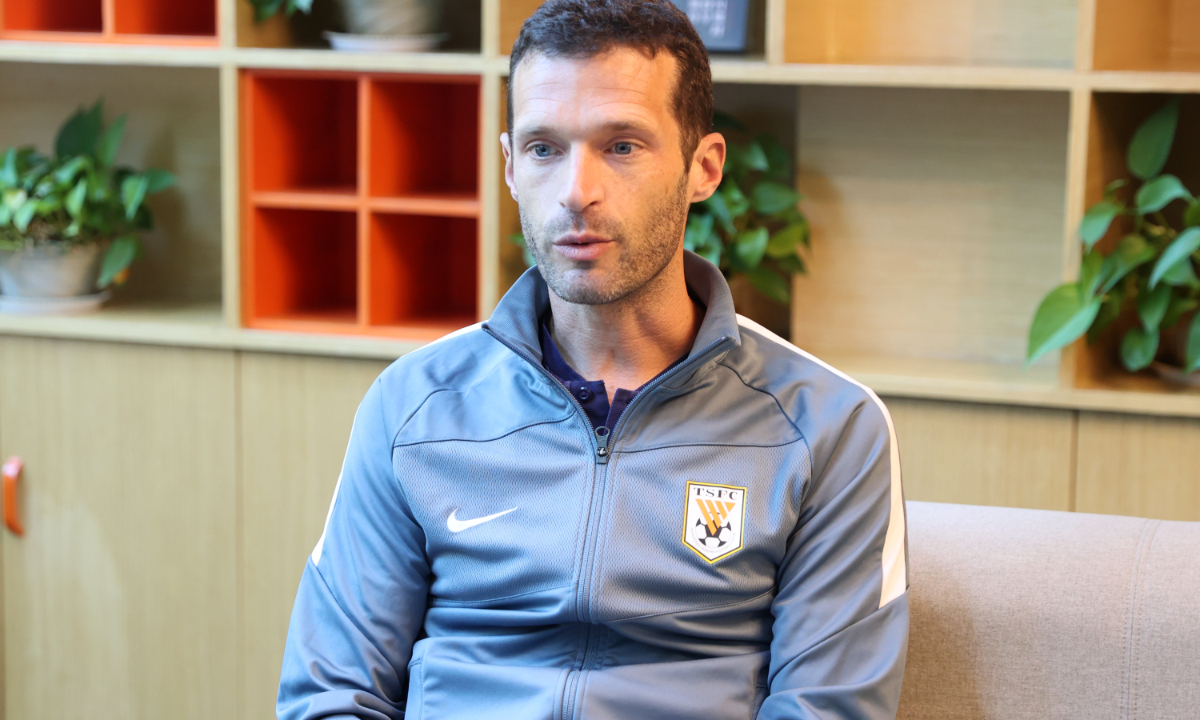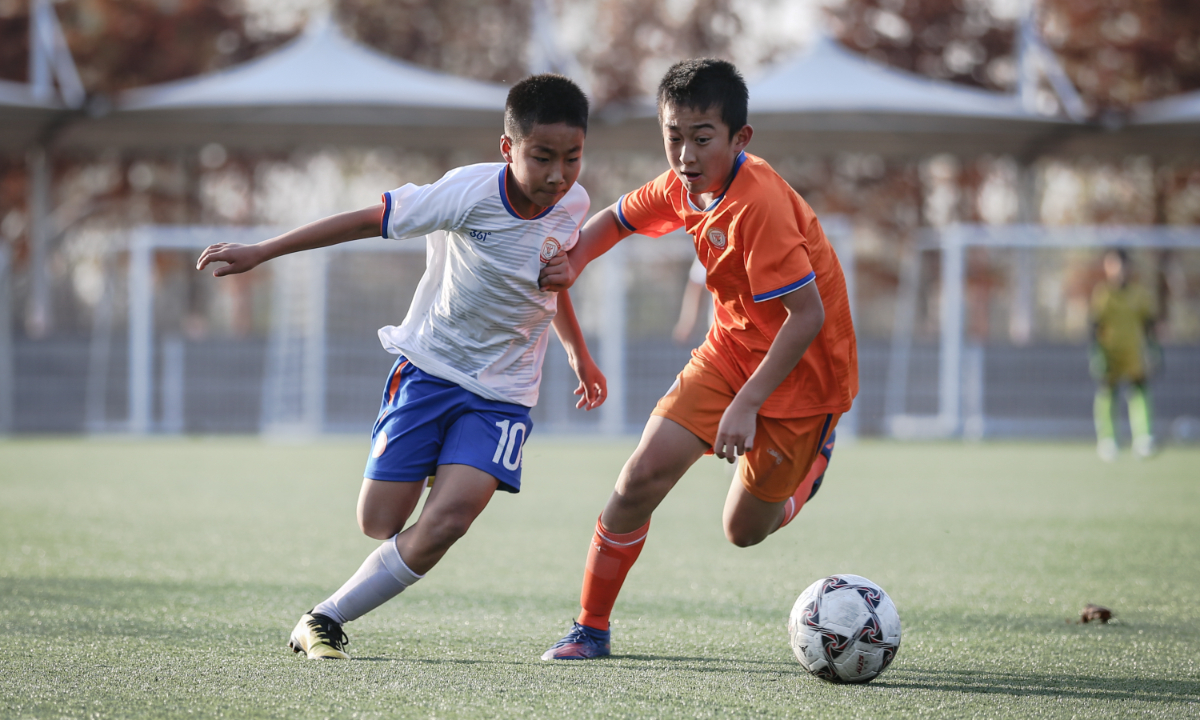Editor’s Note:
China’s modernization has been an epic journey over the last few decades. Under the leadership of the Communist Party of China (CPC), China has become an attractive destination for many foreigners. Many such expats in the country have fulfilled their career aspirations, while some have found love and started families in China.
Why do they choose to live in China? How do expats in China view and interpret China’s achievements and persistence measured from various perspectives?
The Global Times interviewed multiple international residents in China from all walks of life, some of whom have made tangible contributions to China’s development, to learn about their understanding of the essence of Chinese culture, and gain an insight into how far China has advanced in its pursuit of development and rejuvenation over the last decade.

Simon Freitas Photo: Courtesy of Shandong Taishan Football Club
Generally speaking, all of Simon Freitas’ work is related to soccer.
He would come to the office at 8.00 am every morning. During working hours, he watches games and training sessions, analyzes the performance of teams and players, writes some materials, and prepares for meetings and training sessions, the Portuguese national described his daily routine to the Global Times.
Freitas has been working at the Shandong Taishan Football Club, also known as Luneng to most Chinese soccer fans, for almost seven years, now serving as the technical director at the club’s soccer school.
In recent years in China, Freitas has devoted himself to soccer and youth training work. He has gained a deep understanding of the current situation of Chinese soccer and Luneng youth development program, brought advanced soccer concepts, and injected a highly dedicated spirit and passion to the sport, which are expected to help the advancement of young talent in China.
Settle down in China
Freitas, now 42, is from Porto, Portugal. The city is famous for its beautiful port, as well as its FC Porto soccer team.
Freitas majored in Sports Science at the University of Porto and earned a PhD in 2013. The main field of his postdoctoral research is the psychological skill training of outstanding soccer players.
In his professional career, Simon has served as assistant coach for the Liga Portugal. As a licensed coach at the Union of European Football Associations (UEFA), he has more than one decade of coaching experience in different positions for different professional soccer leagues.
Luis Castro, the technical director during Freitas working in the FC Porto youth training program, invited him to work in China and started this wonderful adventure.
He came to Luneng in 2016 and has coached Luneng’s U17 team in China and the Desportivo Brasil club in Brazil, which is also owned by the Shandong Luneng Group.
Moving to a remote and strange country, Freitas admitted he took the challenges naturally and settled down quickly.
“The football industry requires us to constantly adapt to unfamiliar environments. When I came to China in 2016, it was actually the first time I had left Europe to work. In the proceeding years, I mainly worked in China, went to the base in Brazil, and led the team back to Europe. I am now well adapted to work and life,” he said.
In 2017, leading Luneng’s youth team to participate in the National Games and qualifying to reach the final match was one of his best memories in China.
In 2020, he was appointed the technical director at the Luneng soccer school.
While working for the club, he has developed a relatively mature concept and long-term plan to help the club and Chinese soccer overall to nurture its own burgeoning talent.
“In the years of working in the soccer school, I have worked hard around cultivating elite players. Correspondingly, I have also designed a game concept that serves the cultivation of elite players,” Freitas said.
He has managed to set up a team structure with one to three periods, so that the team as a whole and individual players are able to continue to grow in the most suitable environment.

Young players during a training game in Luneng soccer school Photo: Courtesy of Shandong Taishan Football Club
Deep observation
After many years of living and working in China, Freitas has his own observations on China’s soccer, be it its development or the inherent challenges.
“My first impression of China was surprise, because there are so many excellent soccer youth training talents here, as talented young players can often be encountered,” he said.
“At the same time, I was also thinking about why there have not been many elite professional football players emerging in China for so many years,” he noted.
Freitas found that there are many young players with great potential in China, which can often be seen in the competition and selection process, but the Chinese Football Association needs to continue to work hard to create a good youth training environment across the country. “As far as the current situation is concerned, China does not have the ability to cultivate the future ‘Cristiano Ronaldo’ yet.”
Since entering the World Cup for the first and only time to date in 2002, the Chinese men’s soccer team has not shown much improvement. By contrast, Chinese women’s soccer team has performed well in recent years. In February, the women’s team beat South Korea from two goals down in the dramatic final of the AFC Women’s Asian Cup winning with three goals.
Freitas believed that the contrasts show the essence of soccer: The basic guarantee of soccer is effective training time.
“European professional women’s soccer started very late, while this in China has a relatively long history,” he said. “The situation of European men’s soccer and that of Chinese men’s soccer are just the opposite. Effective training time, especially in the youth training stage, is crucial.”
“I look forward to the time when the Chinese Football Association will address the importance of youth training. Young players should be able to fully grow in a complete youth training cycle, including letting the 17 or 18-years-olds to participate in the professional league,” he said.












